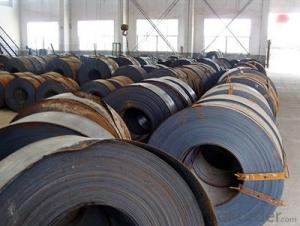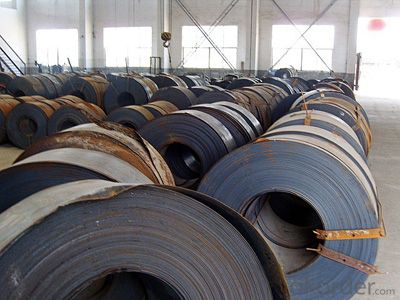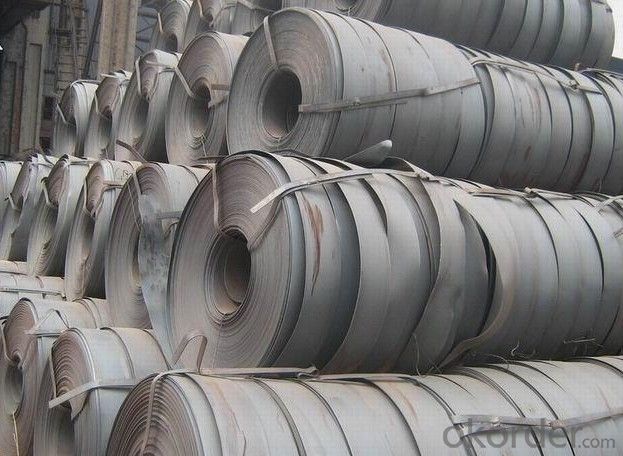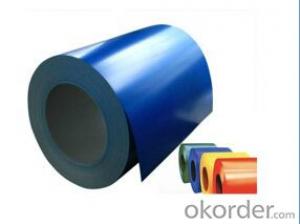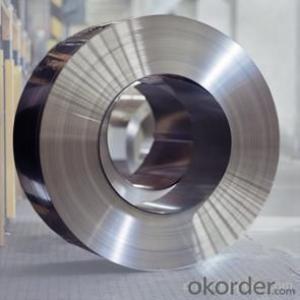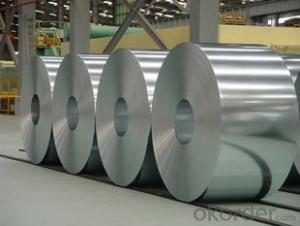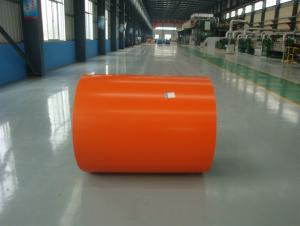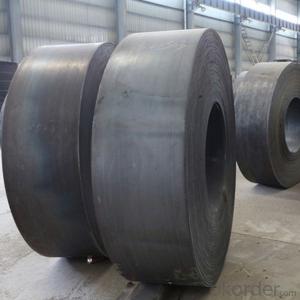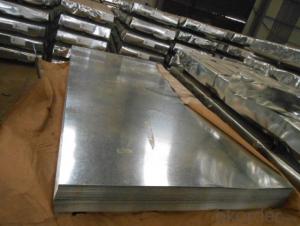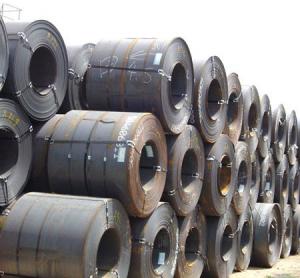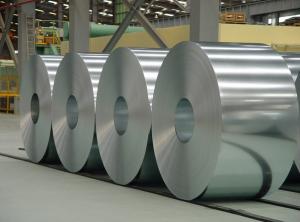hot sale galvanized steel coil from factory
- Loading Port:
- Tianjin
- Payment Terms:
- TT OR LC
- Min Order Qty:
- 1000 m
- Supply Capability:
- 10000 m/month
OKorder Service Pledge
OKorder Financial Service
You Might Also Like
Quick Details
| Standard: | GB,JIS | Grade: | SS grade 33-80,SGCC, SGCH, SGCD1-SGCD3 | Thickness: | 0.12mm-1.2mm |
| Place of Origin: | Shaanxi China (Mainland) | Brand Name: | HUALU | Model Number: | SGCC,SGCH,SGCD1-SGCD3,DX51D |
| Type: | Steel Coil | Technique: | Cold Rolled | Surface Treatment: | Galvanized |
| Application: | Flange Plate | Special Use: | High-strength Steel Plate | Width: | 914mm-1250mm |
| Length: | as per customer's requirement | thickness tolerance: | +/-0.03mm | width tolerance: | +/-0.03mm |
Packaging & Delivery
| Packaging Detail: | Exporting package standard. Steel strip Water proof paper, metal covers |
| Delivery Detail: | within 15-30 days |
Our Advantages
1. more than 10 years experiences in steel business
2. good quality
3. competitive price
4. meet your needs via reprocessing
5. excellent service
6. short delivery time
7. long mutual beneficial business cooperation
8. certificate: ISO:9001
Main characteristics :
1.strong corrosion resistance
2.surface quality
3.conducive to deep processing
4.economy and practicality
Applications:
1) Pre-galvanized steel tubes and pipes.
2) Galvanized steel channels and profiles.
3) Armoring cable.
Commodity | china galvanized steel coil | |
Techinical Standard: | JIS 3302 / ASTM A653 / EN10143 | |
Grade | DX51D / DX52D/ DX53D/ S250,280,320GD | |
Types: | Commercial / Drawing / Deep Drawing / Structural quality | |
Width | 914/1000/1200/1219/1220/1250mm | |
Thickness | 0.12-1.2mm (0.2-1.0mm is the most advantage thickness) | |
Type of coating: | galvanized | |
Zinc coating | Z40-200/m2 | |
Surface treament | chromed / skinpass/ oiled/slightly oiled/ dry/ anti-fingerprint | |
Surface structure: | zero spangle / minimized spangle / regular spangle/ big spangle | |
ID coil | 508mm | |
Coil weight | 3-8 MT per coil | |
Package: | Properly packed for ocean freight exportation in 20''containers | |
Application: | Industrial panels, roofing and siding for painting | |
Price terms | FOB,CFR,CIF | |
Payment terms | 30%TT in advance+70% TT or irrevocable 70%L/C at sight | |
delivery time | 25 days after recepit of 30% TT | |
Remdarks | Insurance is all risks | |
MTC will be handed on with shipping documents | ||
We accept the third party certificatation test |
Chemical compositon:
STEEL GRADE | CHEMICAL COMPOSITION % | MECHANIC PROPERTY | C.B OF COATING | COATING | |||||||||
C | Si | Mn | S | P | T.S | Y.S | E.L | ||||||
x103 | x103 | x102 | x103 | x103 | Mpa | Mpa | % | d=0 180° | G/M² | ||||
JIS G3302 SGCC | 12 | 30 | 41 | 31 | 21 | 480 | 300 | 13 | OK | Z60-150 | |||
JIS G3302 SGCH | 12 | 10 | 21 | 18 | 8 | 680 | 650 | OK | Z60-150 | ||||
ASTM A653 CS.B | 20 | 30 | 60 | 35 | 30 | 386 | 205~380 | 20 | OK | Z80-275 | |||
DX51D+Z | 29 | 21 | 18 | 1.8 | 11 | 355 | 245 | 38 | OK | Z80-275 | |||
- Q: I'm sort of a sword maker. You could say I'm an amateur blacksmith. I want to find a dependable source of high-grade steel. I've made a few blades and from what I know about the difference between true steel and cheap steel, I have yet to work with such. All of the metal I have used could not have been true high carbon spring steel because while they are hard, their properties do not reflect that of true steel. I would sincerely appreciate any guidance on where I could order some fine-quality steel so I could produce a truly fine blade.
- You have already a good answer, but you have to bear in mind that in your work you need to follow the correct procedure for heat treatment. That procedure is dependent on the type of steel you have picked on.
- Q: How are steel coils loaded onto trucks or containers?
- Steel coils are typically loaded onto trucks or containers using specialized equipment such as coil lifters or coil hooks. These devices safely secure the coils and allow them to be lifted and positioned onto the truck or container. The coils are then secured in place using straps or other restraints to prevent them from shifting during transportation.
- Q: What are the different types of steel coil surface treatments for indoor applications?
- There are several different types of steel coil surface treatments that are suitable for indoor applications. These treatments are designed to enhance the appearance, durability, and performance of the steel coil in various indoor environments. Some of the common surface treatments for indoor applications include: 1. Galvanized Coating: This is one of the most popular surface treatments for indoor applications. Galvanizing involves applying a layer of zinc to the steel coil, which provides excellent corrosion resistance and protects the steel from environmental elements. 2. Pre-painted Coating: Pre-painting the steel coil with a specific color or finish is another common surface treatment for indoor applications. This coating not only improves the aesthetics of the steel, but also provides additional protection against corrosion and wear. 3. Powder Coating: Powder coating is a process where a dry powder is electrostatically applied to the steel coil and then cured under heat. This treatment creates a durable and attractive finish that is resistant to chipping, scratching, and fading. Powder coating is available in a wide range of colors and textures, making it a versatile choice for indoor applications. 4. Vinyl Coating: Vinyl coating is a type of surface treatment that involves applying a layer of PVC (polyvinyl chloride) to the steel coil. This coating provides excellent chemical resistance and protects the steel from moisture, abrasion, and UV radiation. Vinyl coating is commonly used in indoor applications where chemical exposure or moisture resistance is a concern. 5. Laminated Coating: Laminating the steel coil involves bonding a thin layer of plastic or other material to the surface of the steel. This treatment enhances the appearance of the steel and provides additional protection against scratches, stains, and fading. Laminated coatings are available in various colors and patterns, making them suitable for indoor applications where aesthetics is a priority. It is important to consider the specific requirements of the indoor application when choosing a steel coil surface treatment. Factors such as corrosion resistance, durability, aesthetics, and budget should be taken into account to ensure the best possible performance and longevity of the steel coil in indoor environments.
- Q: How are steel coils used in the production of automobile frames?
- Automobile frames rely heavily on steel coils, which are indispensable for their production. These coils, crafted from top-notch steel, undergo a process of uncoiling before being fed into a stamping press, where they assume various forms, constituting parts of the frame. The presence of steel coils is crucial as they furnish the frame with the requisite strength and rigidity, ensuring it can bear the vehicle's weight and maintain structural integrity. Once shaped, the coils are frequently welded together to construct the frame structure. This welding procedure securely binds the individual components, guaranteeing that the frame can endure the forces and strains encountered during the vehicle's operation. Utilizing steel coils in the production of automobile frames also allows for design flexibility, as they can be effortlessly shaped and manipulated to fulfill specific requirements. Moreover, steel coils possess exceptional durability and corrosion resistance, rendering them ideal for automotive applications. Frames fashioned from these coils are not only robust and dependable but also capable of withstanding harsh conditions and road vibrations. This not only enhances the vehicle's safety but also contributes to its longevity and overall performance. Steel coils also find use in other critical vehicle components, including suspension systems, chassis, and body panels. Their versatility, strength, and cost-effectiveness make them a favored choice in the automotive industry. Overall, the incorporation of steel coils in automobile frame production plays a significant role in guaranteeing the safety, durability, and performance of modern vehicles.
- Q: Project for school, we're learning about periodic elements and we have to choose an item from our hobbies to research what its made of. Any ideas on steel guitar strings??
- Steel is usually mainly made up of Iron (Fe) element, but it can also include Carbon (C) for a stronger steel or Nickel (Ni) for stainless steel.
- Q: I know sterling silver can tarnish, so I was just wondering, how does stainless steel hold up?
- This Site Might Help You. RE: How durable is stainless steel jewelry? I know sterling silver can tarnish, so I was just wondering, how does stainless steel hold up?
- Q: I was wondering if steel cases can be loaded to the same pressure as brass cases. Are the cartridges that commonly feature steel cases like the Russian 5.45x39, 7.62x39 and 7.62x54R loaded to a lower pressure than their C.I.P. MAPs (380 MPa, 355 MPa, 390 MPa --gt; 51,488 psi to 56,564 psi)? There must be a reason why most NATO armies use brass cases...
- Steel cases are harder to manufacture, but cheaper in material. Loaded? Yes. Those cases are a very mild steel, and will 'flow' well enough to seal at the pressures involved. The question might come up with low pressure loads though. RE-loaded?? - I wouldn't try it, even if they weren't berdan primed.
- Q: Which is used for what?Differences as far as style etc.???Better in your opinion and why??I'm just beginning to look at guitars i might be able to get at christmas if i'm still committed..i've been looking online.,,,,NYLON or STEEL STRINGED ACOUSTIC GUITAR????Thanks.
- u can play any type o music with steel stringed guitar.. but with nylon string ,guitarist usually pick the strings with finger nails,coz its will be hard to hit that with guitar picks coz there will be a chance of string popping nylon string gutiars are used for classical guitar playing... the tone is somehow sweeter on nylon.. but its up to you according to your music style
- Q: The steel is orangish in colour and is mostly made of copper
- Steel is an alloy of iron and carbon and optionally one or more of numerous other materials. Copper is normally not used, except sometimes in small percentages. Steel is never yellow or orange in color. Reactivity of steel depends on the materials it is alloyed with. Chromium and nickel with steel make stainless steel, which is much less prone to reactive than iron. .
- Q: How do steel coils contribute to the sustainability of construction projects?
- Steel coils contribute to the sustainability of construction projects in several ways. Firstly, steel is a highly durable material that can withstand harsh weather conditions, reducing the need for frequent repairs or replacements in buildings and infrastructure. Additionally, steel coils can be recycled, reducing the demand for virgin materials and minimizing waste. The use of steel in construction also enables the creation of lightweight and energy-efficient structures, promoting sustainability by reducing the energy consumption required for heating, cooling, and transportation.
Send your message to us
hot sale galvanized steel coil from factory
- Loading Port:
- Tianjin
- Payment Terms:
- TT OR LC
- Min Order Qty:
- 1000 m
- Supply Capability:
- 10000 m/month
OKorder Service Pledge
OKorder Financial Service
Similar products
Hot products
Hot Searches
Related keywords
